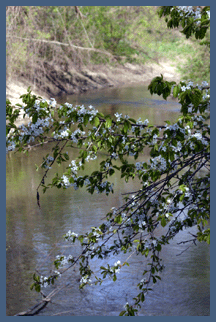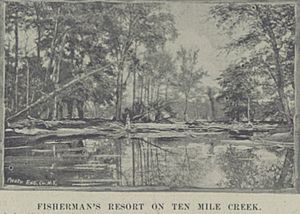Ottawa River (Lake Erie) facts for kids
Quick facts for kids Ottawa |
|
|---|---|

The river passing through Ottawa Hills, Ohio
|
|
| Country | United States |
| Physical characteristics | |
| Main source | Southeast Michigan |
| River mouth | Lake Erie |
| Length | 15 mi (24 km) |
The Ottawa River, also known as Ottawa Creek, is a short river in the United States. It flows through northwest Ohio and southeast Michigan. It's about 20 mi (32 km) long. If you include its longest branch, Tenmile Creek, it stretches to about 48 mi (77 km).
This river drains land near the Ohio-Michigan border. It flows along the edges of Toledo and through Ottawa Hills. Finally, it empties right into Lake Erie. There's another river in northwest Ohio with the same name. That one is a branch of the Auglaize River.
The upper part of the river in Michigan is called North Tenmile Creek on maps. This section is about 4 mi (6.4 km) long. Another branch starts in Fulton County, Ohio, and is called Tenmile Creek.
North Tenmile Creek begins in extreme southeastern Michigan. It starts southwest of Ottawa Lake. This is about 3 mi (4.8 km) north of the Ohio-Michigan state line. The creek flows south across the state line into Sylvania, Ohio.
In Sylvania, North Tenmile Creek joins with Tenmile Creek. This is where the Ottawa River officially begins. This spot is about 5 mi (8.0 km) northwest of Toledo. The river then flows southeast into western Toledo. After that, it turns and flows northeast.
For its last 5 mi (8.0 km), the Ottawa River flows along the north side of Toledo. It runs roughly parallel to the Maumee River. The two rivers are separated by about 2 mi (3.2 km). The Ottawa River crosses the Michigan state line for its final 1 mi (1.6 km). It then enters Little Maumee Bay on Lake Erie.
River Health: Understanding Pollutants
Scientists have checked the water quality in the lower part of the Ottawa River. They found many chemicals in the water. Some of these chemicals were at levels that could be harmful. These included things like lead, aluminum, and PCBs. Other chemicals found were manganese, iron, and DDT.
The river's water quality is not very good for a few reasons. First, the river flows slowly. This means pollutants don't get washed away quickly. Second, pollution comes from urban runoff. This is rainwater that flows over city streets and picks up dirt and chemicals. Pollution also comes from landfills and sewers.
The City of Toledo is working hard to clean up the river. They have made this a top goal. They are taking steps to clear landfills and clean up the smaller streams that flow into the river.
Bringing Back Nature: Dam Removal
In 2001, a group called the U.S. Fish and Wildlife Service suggested removing a dam. This dam had been in the Ottawa Hills part of the river for a long time. The goal was to let the river flow naturally again. This helps fish move freely up and down the river. It was also noted that the dam was a danger to the village.
One dam was removed in 2007. Another dam was taken out in 2020. Removing these dams helps the river become healthier. It also makes the area safer.
 | Kyle Baker |
 | Joseph Yoakum |
 | Laura Wheeler Waring |
 | Henry Ossawa Tanner |



